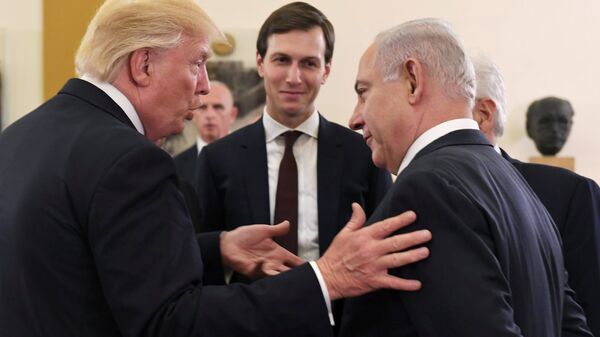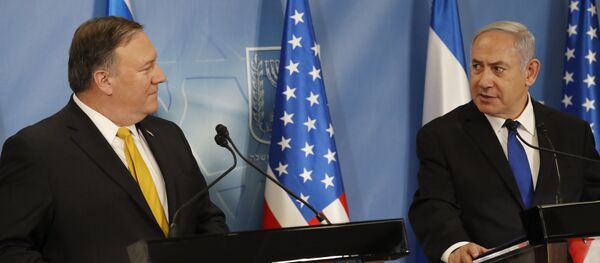Avigdor Eskin, an Israeli political analyst and publicist who predicted Netanyahu's victory back in November 2018, believes that Washington and Tel Aviv will continue to strengthen Israel's positions in the region following the de facto recognition of Jerusalem on 14 May 2018 and Israel's sovereignty over the Golan Heights on 25 March 2019.
"I anticipate Israeli official recognition of towns and villages on the West Bank (Judea and Samaria) as a part of the state and I also anticipate US recognition. We will also see the attempts to negotiate with Gaza. Egypt will play an important role", the Israeli publicist foresees.
However, earlier, commenting on a long-anticipated Trump "peace plan", American Special Representative for International Negotiations Jason Greenblatt dismissed the use of the term "two-state solution" in the upcoming talks between the Israelis and Palestinians, saying that each side understood it differently.
Trump's Middle East plan will be unveiled only in June, as the US president's senior adviser and son-in-law Jared Kushner announced on 17 April.
Speaking to Sputnik, Eskin suggested that Israel would also continue military operations in Syria against Iranian forces and Iranian proxies operating on the ground — something that Tehran vehemently denies.
On 13 April, Israel reportedly conducted airstrikes against an alleged Iran-linked "missile factory" in Syria's Hama province. According to the Syrian Armed Forces, they managed to intercept some of the missiles. Previously, in March, the Israeli Air Force (IAF) allegedly carried out an aerial attack on Aleppo.
Tel Aviv has repeatedly attacked supposed Iranian targets in the territory of Syria, while Tehran continues to reject the claims that it has ever deployed Iranian troops or bases in the Arab Republic.
Netanyahu Enjoys Considerable Backing in Knesset
Netanyahu's victory was endorsed by right-wing parties in the US, Europe, and Asia. Donald Trump, Austrian Chancellor Kurtz, Italian Interior Minister Salvini, and Indian PM Modi warmly congratulated Netanyahu on his win, while Berlin stated laconically that it would work closely with any new Israeli government.
I just talked with Prime Minister @netanyahu. I congratulated him again on his great result in the elections on 9 April. We agreed to further strengthen the excellent bilateral relations between #Israel & #Austria.
— Sebastian Kurz (@sebastiankurz) 11 апреля 2019 г.
So, can we talk about the emergence of a sort of an "international right-wing bloc"?
"'The conservative international' is not getting formed in a sense as the 'Socialist International'. But we see close cooperation and deep sympathy. I would add to the list Russian President Vladimir Putin, President of Brazil Jair Bolsonaro and the prime minister of Hungary, Viktor Orban".
Thank you my good friend, Brazilian President Jair Bolsonaro! https://t.co/rwTVga1udw
— Benjamin Netanyahu (@netanyahu) 11 апреля 2019 г.
As for Netanyahu's major political rival — Benny Gantz's Kahol Lavan — the political analyst doubts that he would be able to "embitter" Netanyahu's political life.
"Benny Gantz said before that he would have joined a national unity government headed by Netanyahu. Then he said that not Netanyahu, but someone else from the Likud. And now nobody is talking about a national unity government. Only right-wing and religious parties are expected to be in the next government", Eskin elaborated.
He noted that Kahol Lavan's programme was not so much different from that of Likud.
The parties went head-to-head during the elections and ended up with 35 seats each. However, in addition to his Likud Party, Netanyahu has the support of the ultra-Orthodox Shas Party, right-wing United Torah Judaism alliance, Union of Right-Wing Parties, Kulanu centrist party, and the secular Yisrael Beytenu Party. This helped him gain upper hand over Gantz, who received backing from his Kahol Lavan alliance, the left-wing Meretz Party and the Israeli Labour Party.
*Daesh (ISIS/ISIL/Islamic State) is a terrorist organisation banned in Russia.
The views expressed in this article are solely those of the contributor and the speaker and do not necessarily reflect the official position of Sputnik.





